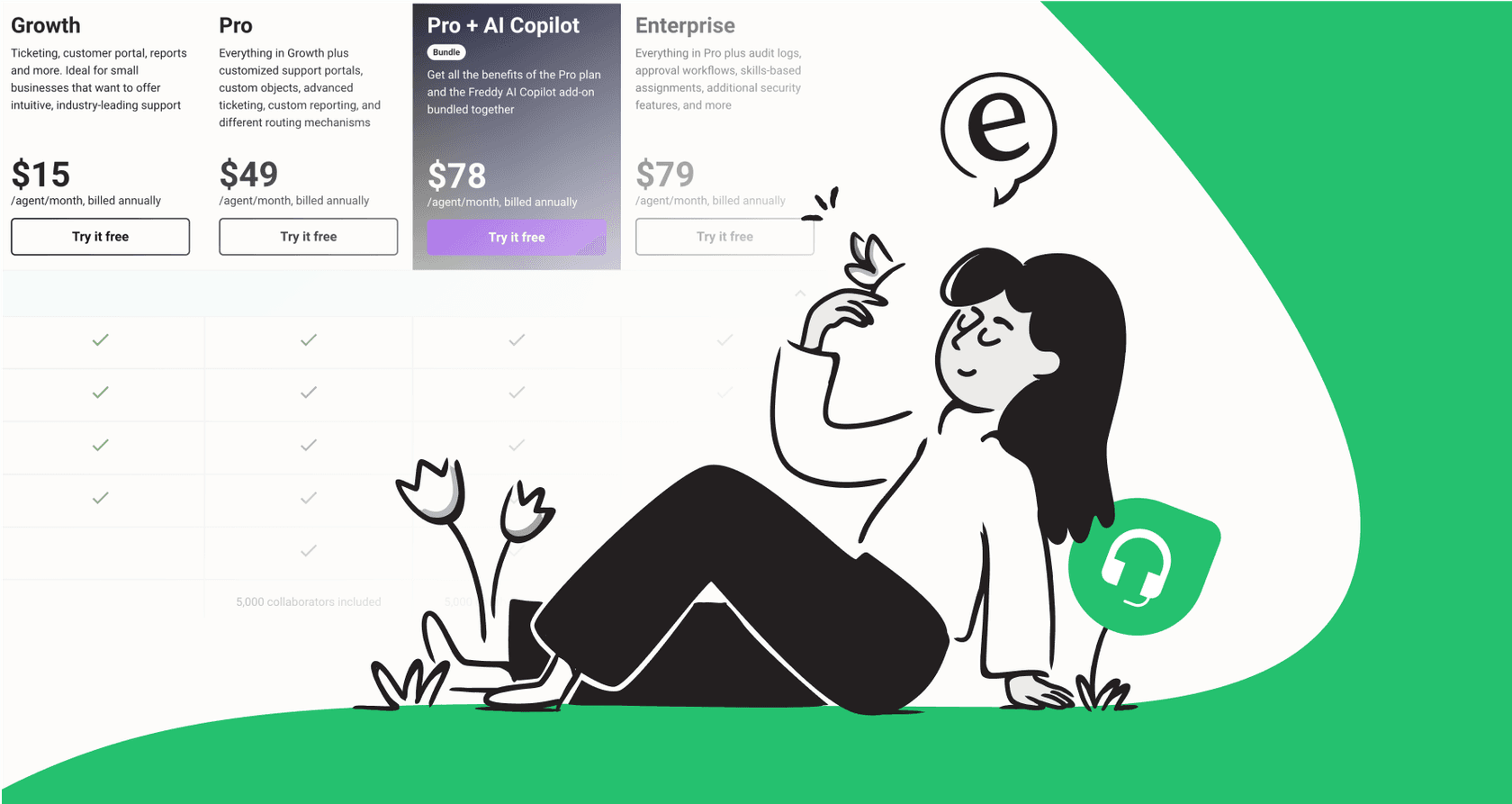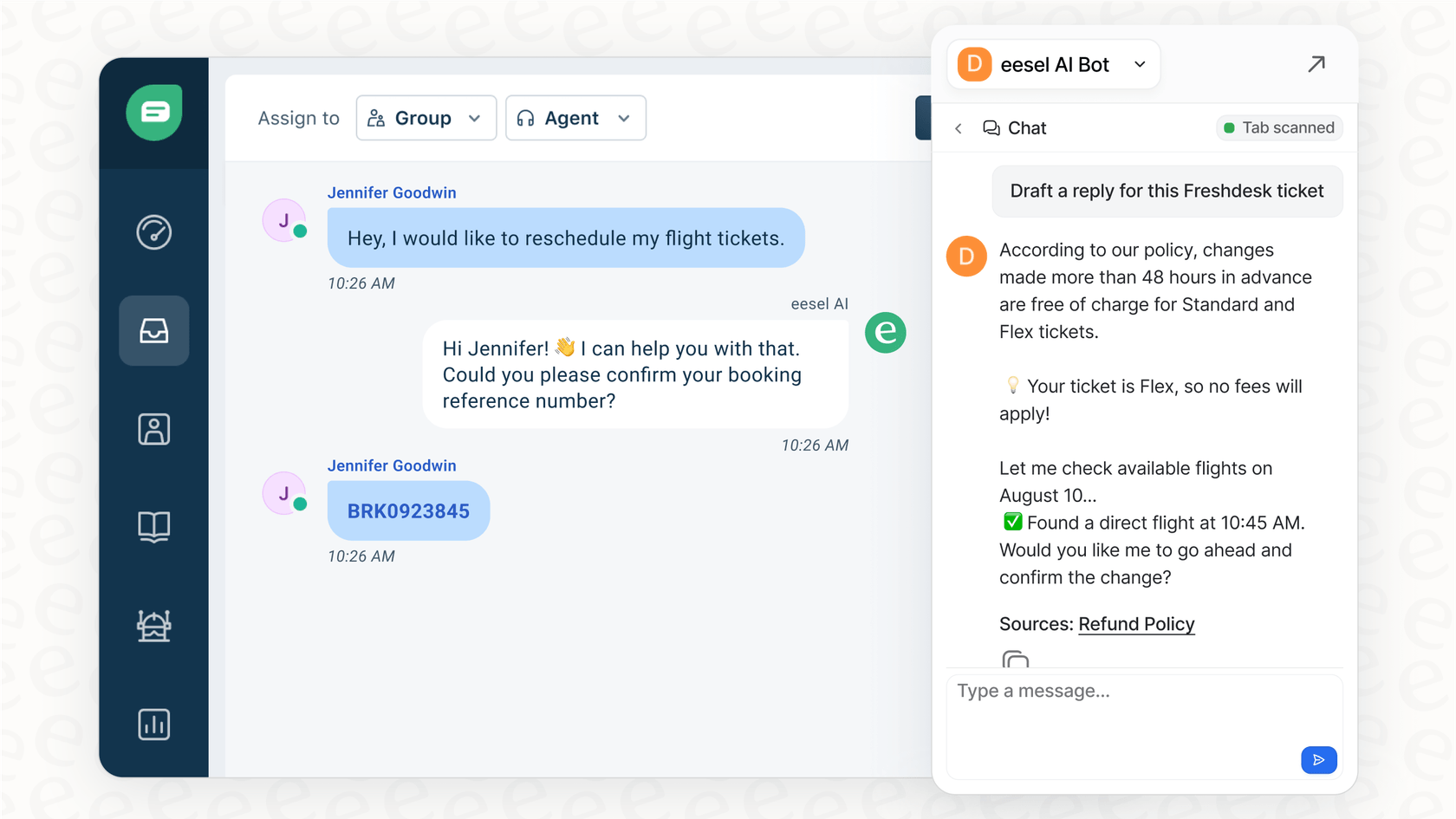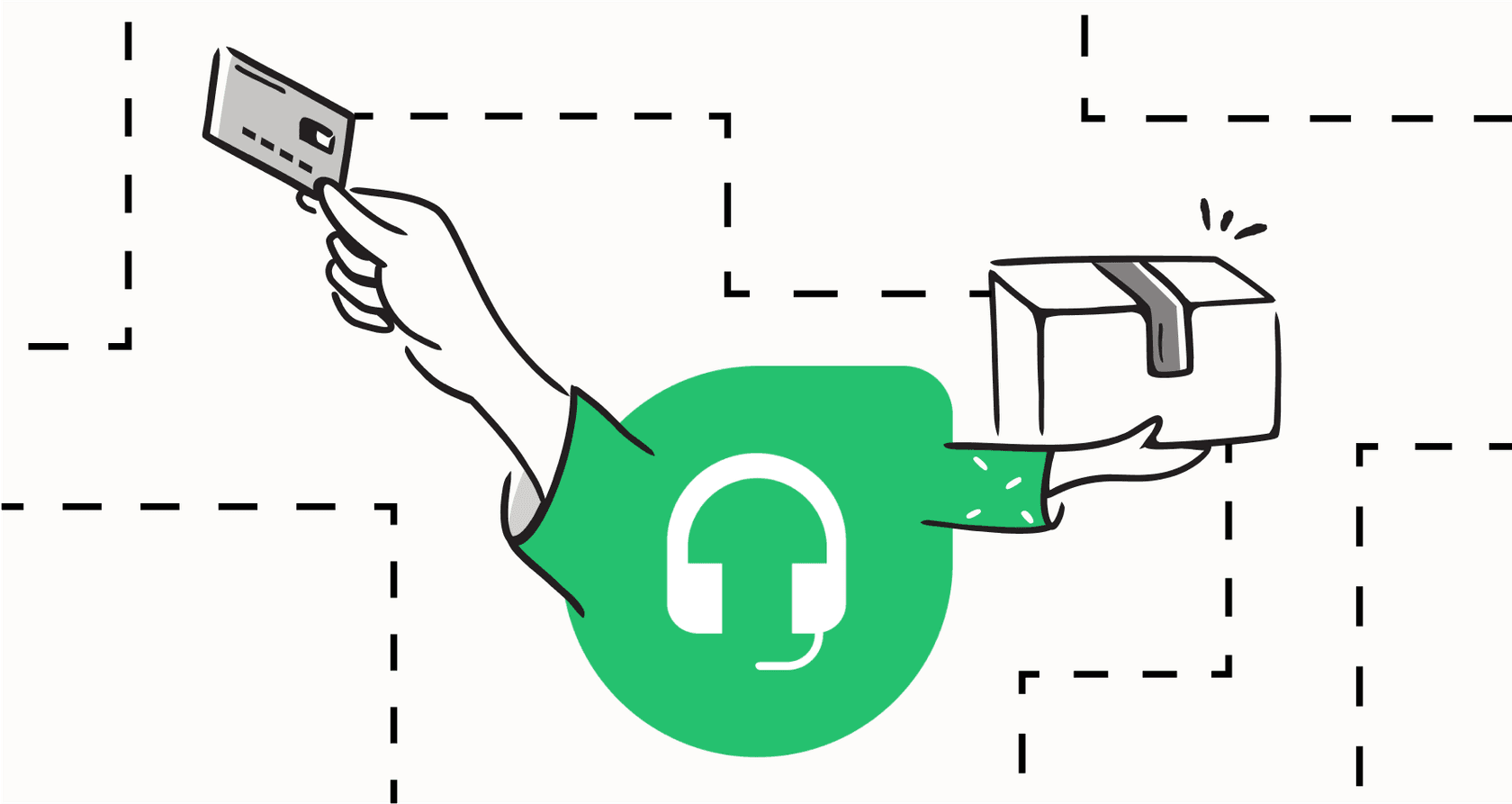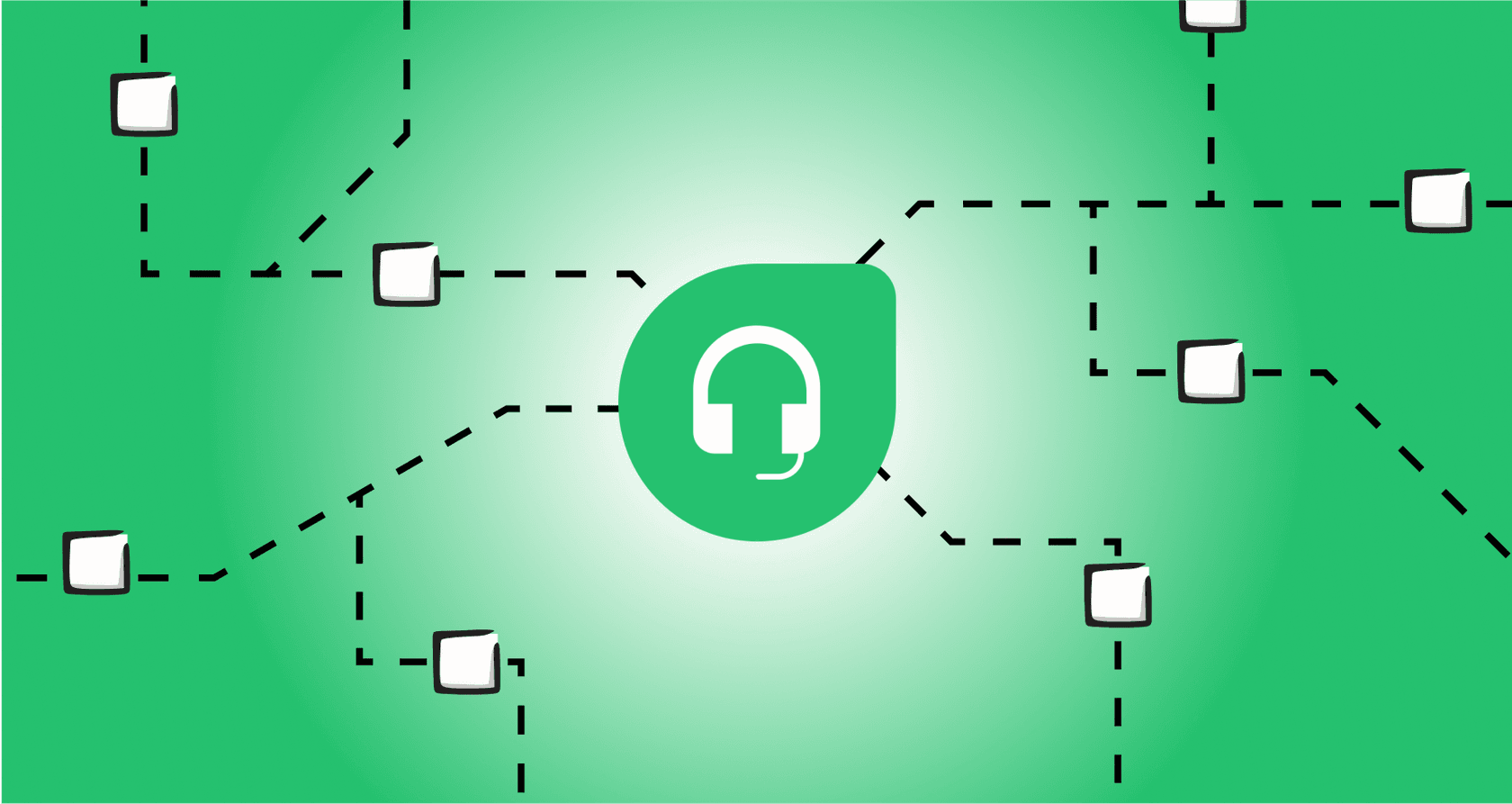A complete guide to the Freshdesk agent: Roles, pricing, and features

Stevia Putri

Stanley Nicholas
Last edited January 16, 2026
Expert Verified

So, your team is using Freshdesk. It's a popular helpdesk for a reason: it's a robust, mature platform that powers customer service for thousands of companies. If you want to scale your support effectively in 2026, you need to get a real handle on the Freshdesk agent: what the roles mean, what the workspace offers, and how to manage your seats effectively.
This guide will walk you through all of it. We'll look at the different types of Freshdesk agents, explore the features of their workspace, dig into the pricing model, and explore how smart AI integrations can make your team even more productive.
What is a Freshdesk agent?
A Freshdesk agent is a user license for someone on your team who handles customer support tickets. Freshdesk offers flexible options to ensure you have the right license for every member of your organization.
Freshdesk splits its agents into two main categories:
-
Full-time agents: These are your core support team members, the people logging in every day to solve customer issues. Each one has a dedicated license, billed per agent, per month. This is the standard seat for your primary support staff.
-
Occasional agents: These licenses are perfect for team members who only need to pop into the helpdesk once in a while, such as a manager reviewing tickets or a developer who needs to comment on a technical bug. Instead of a monthly fee, they use a "Day Pass" each time they log in, providing a cost-effective way to collaborate across departments.
| Feature | Full-time agent | Occasional agent |
|---|---|---|
| Intended user | Core, daily support staff | Infrequent users (e.g., managers, developers) |
| Billing model | Per agent, per month subscription | Day Pass charged per login day |
| Best for | Dedicated support roles | Collaborators who need temporary access |
| Cost consideration | Predictable monthly cost | Flexible pricing for infrequent use |
On top of these license types, you can assign different roles like Admin or Supervisor to control what an agent can see and do. Freshdesk offers tiered plans to match different team sizes, with more advanced permissions available as you move into professional tiers to help you manage larger teams with precision.
The Freshdesk agent workspace and its features
Freshdesk offers a Unified Agent Workspace, which is designed to give agents a comprehensive view of customer history, tickets, and communication channels. It is an impressive ecosystem that allows agents to see a customer's past interactions and pull up canned responses without having to leave the ticket they're working on.

While the workspace is highly capable, modern support teams often find that their company's knowledge is spread across various platforms. Important information might be in Confluence pages, Google Docs, or internal wikis. Freshdesk provides a solid foundation, and you can make it even stronger by using integrations that help agents retrieve information from these external sources more quickly.
Even with built-in automation, agents can benefit from tools that help with repetitive tasks. Whether it's categorizing tickets or summarizing long customer threads, there are many ways to enhance the native experience.
One such option is an AI Copilot from eesel AI. It works within the Freshdesk ecosystem to help draft accurate replies. By connecting to your company's broader knowledge base, including Confluence and Google Docs, it allows your Freshdesk agents to stay focused and productive in the tool they already know and trust.

Understanding Freshdesk agent pricing and options
Freshdesk's pricing model is designed to be transparent, offering several tiers to suit different business needs as you grow in 2026.
Here is a breakdown of their official plans. The Free plan gives you up to 10 agents with basic ticketing. The Growth plan, at $15 per agent, per month, adds automation and marketplace apps. The Pro plan is $49 per agent, per month, and unlocks custom roles and reporting. The Enterprise plan is $79 per agent, per month, and includes enterprise-grade features like skill-based routing.
When planning your budget, here are some of the additional options you might consider:
-
Advanced AI features: Freshdesk offers a powerful AI assistant called Freddy AI Copilot. It is available as a specialized add-on for $29/agent/month on Pro or Enterprise subscriptions, providing cutting-edge tools for teams that want to leverage native AI.
-
Flexible Day Passes: The cost for an occasional agent to log in for a day ranges from $2 to $15, depending on your plan. This is a great way to include people from other departments in the support process without committing to a full-time monthly license.
-
Scalable support: As your team grows, Freshdesk's tiered pricing ensures you have access to the features you need. To manage costs while scaling, many teams look for ways to boost the efficiency of their existing agents.
A tool like eesel AI is priced based on AI interactions rather than the number of agent seats. This works alongside your Freshdesk setup, allowing you to provide AI assistance to your entire team. Our core products (AI Agent, AI Copilot, and AI Triage) are included in one straightforward plan, helping you scale your support power effectively.
The rise of the AI Freshdesk agent
To help teams get more from their workspace, Freshdesk has rolled out impressive AI solutions like Freddy AI. Freddy can handle common questions, offer suggestions to human agents, and provide valuable analytics to keep your support operations running smoothly.
This video from Freshdesk explains the capabilities of their Freddy AI agent for providing instant, 24/7 self-service.
Freshdesk's native AI is an excellent starting point, especially because it is built directly into the platform you use every day. To get the most out of your AI strategy, you might also consider complementary AI solutions that can expand your reach.
For example, native AI is often focused on the data stored within Freshdesk. If your team relies heavily on external documentation in Notion or Slack, a third-party AI platform can bridge that gap. Additionally, some teams look for ways to test AI performance on historical data or build custom, multi-step automations that interact with other tools like Shopify.
eesel AI is a specialized option that works within the Freshdesk ecosystem to provide these additional capabilities:
-
Comprehensive knowledge connection: eesel AI plugs into over 100 sources, so your AI assistant has the complete context of your company's intelligence.
-
Safe testing environments: Our simulation mode lets you run AI on past tickets to forecast results and tweak performance before going live.
-
Customizable workflows: You can decide exactly which tickets the AI handles, allowing you to start small and expand your automation as you see the benefits.
Empower your agents for long-term success
At the end of the day, Freshdesk provides a powerful, industry-leading foundation for your support team. As your company grows in 2026, the key to success is making each of your agents more productive and satisfied in their roles.
While Freshdesk's built-in tools are excellent, layering a flexible AI platform over your helpdesk can provide the best of both worlds. You keep the reliable platform you trust, while boosting its capabilities with AI that is highly adaptable and cost-effective.
Ready to see how much more efficient your Freshdesk agents can be? Try eesel AI for free and see how our AI can start assisting your team in minutes.
Frequently asked questions
A Freshdesk agent is a user license for a team member whose role involves handling customer support tickets within the Freshdesk platform. These are the individuals dedicated to resolving customer issues and interacting with the helpdesk.
Freshdesk agent pricing operates on a per agent, per month model for full-time staff. For occasional users, Freshdesk offers Day Passes, which allow agents to log in as needed, providing flexibility for teams with varying support requirements.
The Freshdesk workspace provides a unified view of customer history and communication channels. While it is excellent for internal ticketing, agents can further enhance their efficiency by integrating tools that connect information from sources outside of the helpdesk.
Yes, beyond the standard per-agent fee, Freshdesk offers advanced AI features like Freddy AI Copilot as an optional add-on. Additionally, Day Passes are available for occasional agents who only need periodic access to the system.
AI can significantly boost productivity by automating repetitive tasks, drafting accurate replies from comprehensive knowledge sources, and efficiently categorizing tickets. This allows a Freshdesk agent to focus on more complex and valuable customer interactions.
Absolutely. A Freshdesk agent can utilize third-party AI platforms that integrate directly with Freshdesk but also connect to over 100 other knowledge sources. This provides a complete context for generating answers alongside native Freshdesk data.
Share this post

Article by
Stevia Putri
Stevia Putri is a marketing generalist at eesel AI, where she helps turn powerful AI tools into stories that resonate. She’s driven by curiosity, clarity, and the human side of technology.





